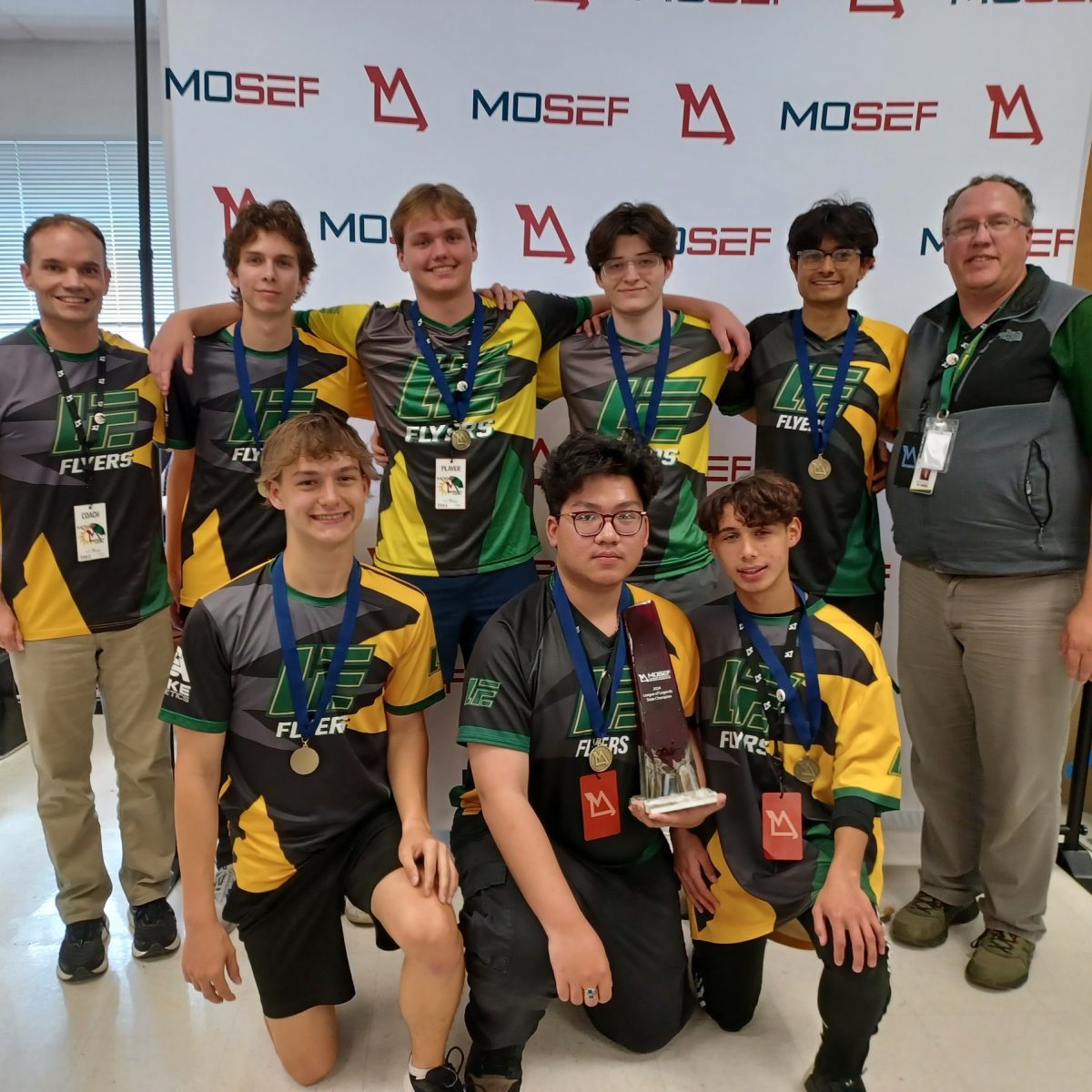After finishing the regular season undefeated, the Lindbergh High School varsity League of Legends esports team – made up of students Thinh Ngo, Nick Wightman, Tony Polesel, Patrick Adams, Biraj Pokhrel, Chase Hummert, Brad Hejlik and coach Doug Barton – finished the year on a high note, winning the state title on May 4.
League of Legends is a multiplayer online battle arena (MOBA) game where two teams of five players compete against each other, attempting to destroy the opponent’s main structure, called the Nexus. Games typically take 30 minutes to complete.
Like other high school sports, the team starts each year with a preseason consisting of scrimmages, leading into the regular season. Following the regular season, teams are split into three groups and compete in regional playoffs, with the winner of each region moving on to the state championship tournament. The second seeds from each region compete once more in a “last chance qualifier,” with the winner also moving on to the state championship tournament. All competitions are held virtually until state.
This year, there were 19 teams competing in varsity League of Legends across Missouri. Many of the schools Lindbergh competed against in the regular season were from farther away, including Columbia and Sikeston. In the state championship tournament, LHS was challenged by Joplin High School, Logan Rogersville High School and Gateway Science Academy—Fyler.
At state in Mexico, LHS played five games in five hours, a mentally draining task for even the highest-level gamer.
“There’s so much strategy and thinking. (It’s) mentally taxing,” Wightman said. “I had brain fog the whole way back. It’s a different kind of tiredness.”
In the tournament’s first game, Lindbergh fumbled to Logan Rogersville, losing their first and only game of the year. The way the competition is set up in a best-of-three format allowed LHS a chance at revenge, and revenge they had, winning the next two matches against LRHS, winning the series 2-1.
Despite the falter at the start of the tournament, LHS won the following series 2-0.
“It was a comeback,” Barton said. “I didn’t realize how much we were down. This game is driven by your gold and how many items you can buy. We were down 12,000 gold or something like that, which is several major items, which is usually really hard to come back from.”
“It’s like being down five points in soccer,” Hejlik added.
Through coordination, teamwork and skill, Lindbergh came back and started to equalize with the opponent before eventually overtaking them by winning one final fight spearheaded by Ngo.
“Off that single play, we were able to end the game before they could respawn. It was just a complete comeback in pretty much that exact moment,” Hejlik said.
Following the first win, the second win came easier with the state championship title in reach.
“You play confident, you win. You feel confident, you play confident. It definitely makes a difference,” Hejlik said.
“A lot of the game is mental. If you feel like you’re going to lose, then you’re way more likely to lose,” Polesel added.
The confidence paid off, as Lindbergh was crowned state champions.
“It felt really surreal. Like, it didn’t really hit until an hour after, I’m not gonna lie,” Pokhrel, the founding member of the LHS League of Legends team, said.
“It was happiness and relief. I’m so glad that they were able to do it. I’m also relieved for them that they don’t have to stress anymore,” Barton added.
History of esports at LHS
The LHS esports program is entering its fourth year, and the League of Legends team its third.
“At the start, it was just Smash Bros., and it pretty much started off as a club. It was an after-school club in the cafeteria,” Hejlik said.
Esports in Missouri are run through the Missouri Scholastic Esports Federation (MOSEF), similar to other sports run through the Missouri State High School Activities Association (MSHSAA). MOSEF approves esports games for official competition. LHS esports competes in League of Legends, Rocket League, Overwatch, Valorant and Super Smash Bros.
The majority of the LHS League of Legends team began playing video games at a very young age. However, it can only be played on a computer, as opposed to consoles like Xbox, PlayStation or any of the Nintendo devices. That, on top of untrue and unfair stereotypes, may prohibit some from joining the team.
“I feel like some people don’t join esports because they’re scared they’ll fall under the stereotypes,” Pokhrel said. “People do take showers, people do put on deodorant, people have lives outside of this game.”
“They can break the stereotype of what a ‘gamer’ is. They’re good students, they have jobs, they’re involved with all sorts of things at school. I feel like they should be recognized for that,” Barton added. “There’s more similarities, I think, than differences (to ‘typical’ sports). Coaching baseball, for instance … let’s say you have a really fast team. Well, you’re going to steal bases, you’re going to bunt, you’re going to take advantage of your speed. If you have a power team, you’re not going to steal, you’re going to play for big innings. The same thing happens with a League of Legends team. Your players all have their different skills, and you figure out how they work together to make your best team.”



